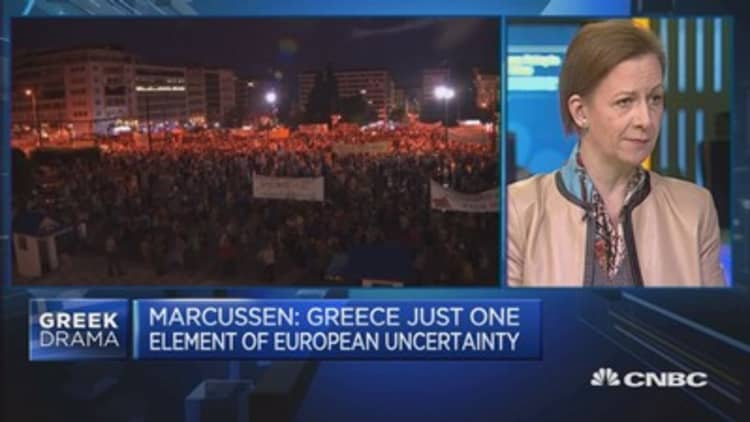The prospect of a U.S. rate rise is coming back into focus for forex markets, putting a fall in the euro to parity versus the dollar back on the cards, some analysts say.
Europe's single currency is down almost 8 percent against the dollar so far this year, but has clawed back from 12-year lows hit in March to climb almost 7 percent to trade just shy of $1.12 on Wednesday.
Over recent weeks, the euro has been driven by ongoing wranglings between Greece and its creditors. Negotiations came to a head on Wednesday, as both sides struggled to agree on reforms needed to secure further aid from international creditors. Without a cash-for-reforms deal, Greece is expected to default on its debt, raising the risk of a hasty exit from the single-currency club.
Read More Greek crisis: Tsipras says 'no deal' with creditors
But although Greece is in focus right now for the euro, attention is turning to the U.S. Federal Reserve, Michala Marcussen, global head of economics at Societe Generale Corporate & Investment Banking (SGCIB) told CNBC's "Squawk Box Europe."
"Ultimately we think the relative stance of monetary policy is going to be one of the most important drivers of euro/dollar over the coming months," she said. "And in that context we do think euro/dollar could come back and start testing parity at some point in time."
A move to the one-to-one level against the dollar, widely seen as likely when the euro fell below $1.05 in March, would imply a fall of over 10 percent from current levels.
Read More Greece deal: Why is the euro falling?
Recovery
Part of the euro's recovery since March can be explained by a weaker tone in U.S. economic data that prompted investors to push back their expectations for the first Fed rate hike in nine years.
But more recent signs that a recovery is gaining momentum, together with hawkish comments from some Fed officials, have fueled talk that the U.S. central bank will tighten policy in September.
Federal Reserve Governor Jerome Powell said on Tuesday that the U.S. economy could be ready for a first rate hike in September followed by a second increase in December.
"The Fed move is the bigger mover for euro/dollar than Greece at the moment. Greece makes for short-term volatility, but the bigger trends are the Fed, the U.S. economy," Berenberg Bank's Chief Economist, Holger Schmieding, told CNBC.
"Unless U.S. data gives us a very clear reason to stay on hold, the Fed will announce in late July that they will hike in September."

All about rates
Against the backdrop of a Fed on the edge of starting a monetary tightening cycle, the outlook for the euro is bearish – even if data from the euro zone gets brighter and the contagion risks from Greece are seen lower compared with a few years ago.
"That's where we have the irony coming, because when we look at what drives currencies it's a multitude of factors. You have the question of what's long-term fair value, and you have the question of relative balance of payments – both point to euro strength and there's stronger data," said Marcussen at SGCIB.
"But you have the relative stance of monetary policy and as the Fed starts to tighten monetary policy I would expect that to be a supportive factor for the dollar."
And as analysts continue to point out – the expected Fed tightening will come as the European Central Bank sticks to a policy of aggressive monetary stimulus to lift euro zone growth.


